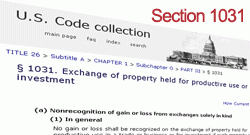BLOG
1031 exchange tips: selecting the right QI

In 2021, over 20% of commercial real estate participated in 1031 Exchanges and commercial property sales nearly doubled 2020's totals. Real estate investors aren't anticipating a slow down for 2022, this means another big year for 1031 exchanges. Given these projections, it is important to remember that choosing the right Qualified Intermediary to help you process your tax deferred exchange is crucial. Read through the tips below on choosing the right team to help you process your 1031 Exchange.
Choosing a Qualified Intermediary (QI) is an important decision, and as such, the process shouldn't be taken lightly. After all, your QI will be guiding you through a maze of federal and state requirements as well as safeguarding the proceeds from the sale of your relinquished property. Given the potential tax consequences involved with an improperly structured exchange and the safety issues related to your proceeds, a true due diligence approach should be taken before committing to a QI.
To begin, let's take a quick look at some of the QI's responsibilities:
- Structuring the exchange
- Preparing the related documentation
- Safeguarding proceeds from the sale of the relinquished property(s)
- Continuous monitoring and advising to ensure compliance with federal and state 1031 and QI requirements
It's important to note that there is currently no federal regulation of qualified intermediaries. However, with the help of the Federation of Exchange Accommodators (FEA), a number of states have begun taking the lead in assuring higher professional standards for QIs. Some of the newly enacted requirements (which can vary from state to state) include:
- Qualified escrow and/or trust accounts for client funds
- Minimum bond and insurance requirements
- Fund withdrawal authorization requirements
- Registration and licensing requirements for QIs
- Investment limitations on exchange proceeds
These are just some of the new state level regulatory requirements for QIs, and Accruit has taken a leadership role in making sure that legislators are fully informed in order to properly protect exchangers. However, our responsibility to inform doesn't stop there. It also includes educating the marketplace to ensure the right due diligence is performed prior to choosing a QI. Items we advise businesses to research include:
- The QI's technical expertise and experience
- Banking processes and guidelines
- Certified Exchange Specialist® (CES®) on staff
- Quality control
- Insurance and bonding coverage
- Employee recruitment (including background checks with continuous monitoring)
- Membership in the FEA
- Applicability and QI's status related to relevant state regulatory requirements
- References
This article is merely intended to start a discussion regarding the importance of choosing the right QI. In practical terms, the process should be far more in-depth and you should include a trusted tax advisor as part of your decision team.
If you'd like more information on selecting a QI, please contact us. We can help you understand the entire process and we're glad to connect you with helpful resources in the tax industry and at the FEA.
Updated 2.08.2022.
